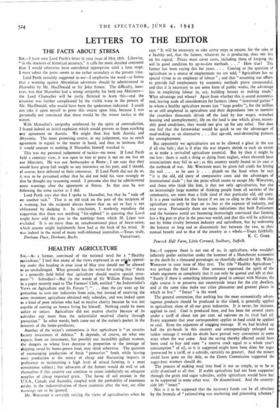THE FACTS ABOUT STRESA
LETTERS TO THE EDITOR
SIR,—I have seen Lord Perth's letter in your issue of May 28th. Likewise, " in the interests of historical accuracy," it calls for more detailed comment than I would otherwise have considered appropriate until a later stage.
must admit the point seems to me rather secondary at the present time.
Lord Perth certainly suggested to me—I emphasise the word—at Stresa that a warning against Abyssinian adventure should be administered to Mussolini by Mr. MacDonald or Sir John Simon. The difficulty, how- ever, was that Mussolini had a strong antipathy for both our Ministers— the Lord Chancellor will be justly flattered to learn this—and the situation was further complicated by the visible wane in the powers of Mr. MacDonald, who would have been the spokesman indicated. I could not take it upon myself to press this course upon him, because I was personally not convinced that these would be the wisest tactics at the outset_
With Muisolini's antipathy reinforced by the spirit of contradiction, I feared indeed an initial explosion which would prevent us from reaching any agreement on Austria. We might then lose both Austria and Abyssinia. The more promising course, in my judgement, was to reach agreement in regard to the matter in hand, and then to intimate that it would amount to nothing if Mussolini himself wrecked it.
This was my personal judgement of tactics—no more. If Lord Perth held a contrary view, it was open to him to press it not on me but on our Ministers. He Was our Ambassador at Rome ; I am sure that they would have given full weight to any insistence on his part, and I should, of course, have deferred to their consensus. If Lord Perth did not do so, it was to be presumed either that he did not hold his view strongly or that he thought my reasoning sound. I presume also that he administered some warnings after the agreement at Stresa. In that case he was following the same tactics as I did.
Lord, Perth says also that I spoke to Mussolini, but that he " rode off en another tack." That is an old trick on the part of the recipient of a warning, but the recipient always knows that an act or fact is not obliterated by dodging it. In conclusion, I modestly repudiate the suggestion that there was anything " far-sighted " in guessing that Laval might have sold the pass in the meetings from which M. Leger was excluded. It is no mole than an unsubstantiated piece of horse-sense, which anyone might legitimately have had at the back of his mind. It was indeed in the mind of many well-informed journalists.—Yours truly,


























 Previous page
Previous page